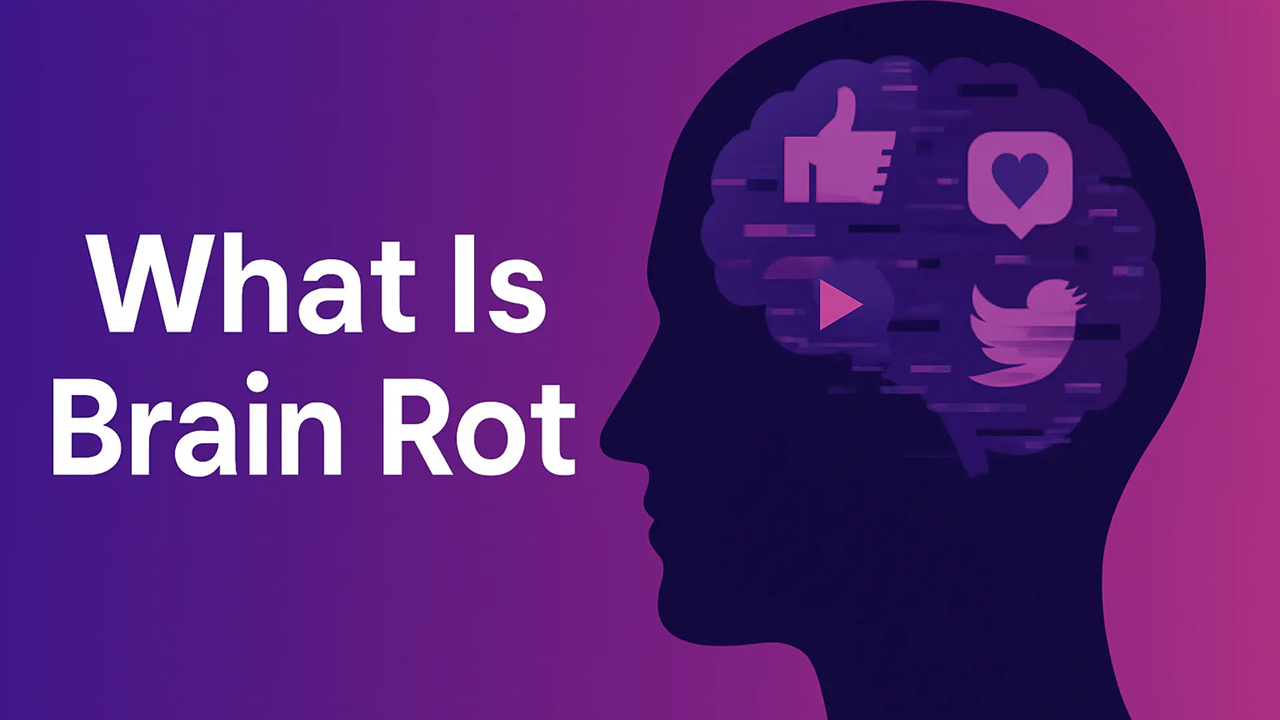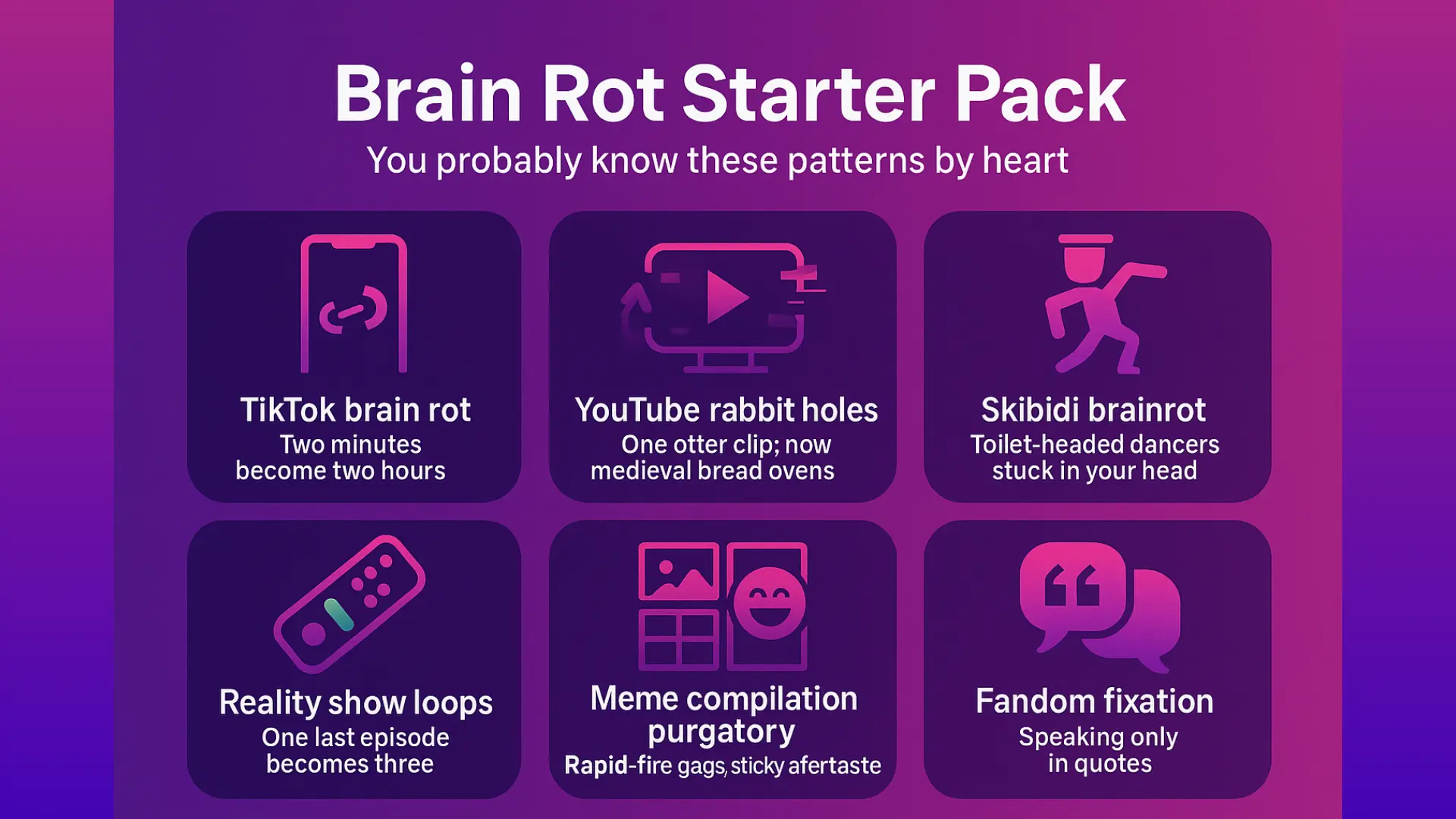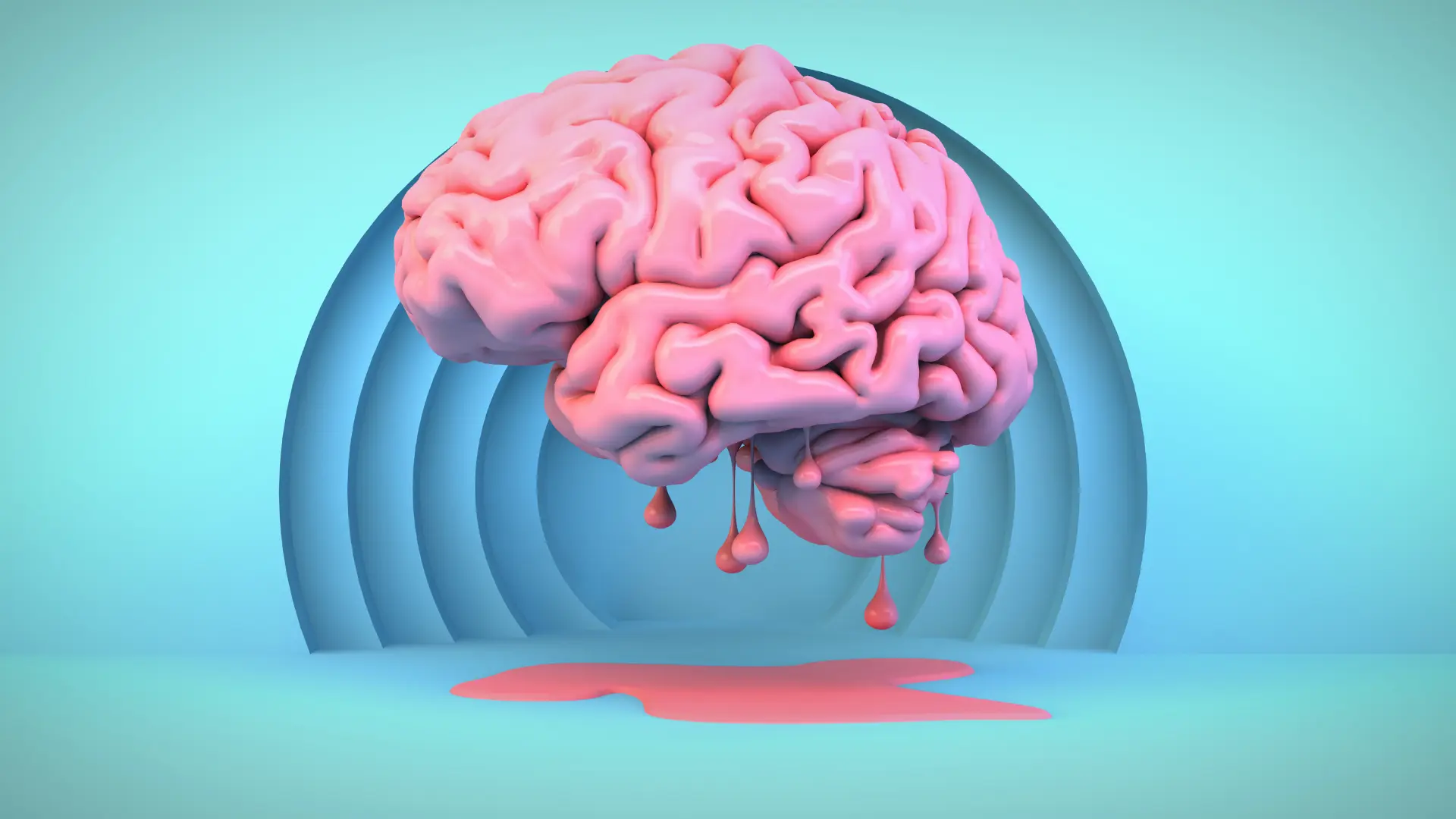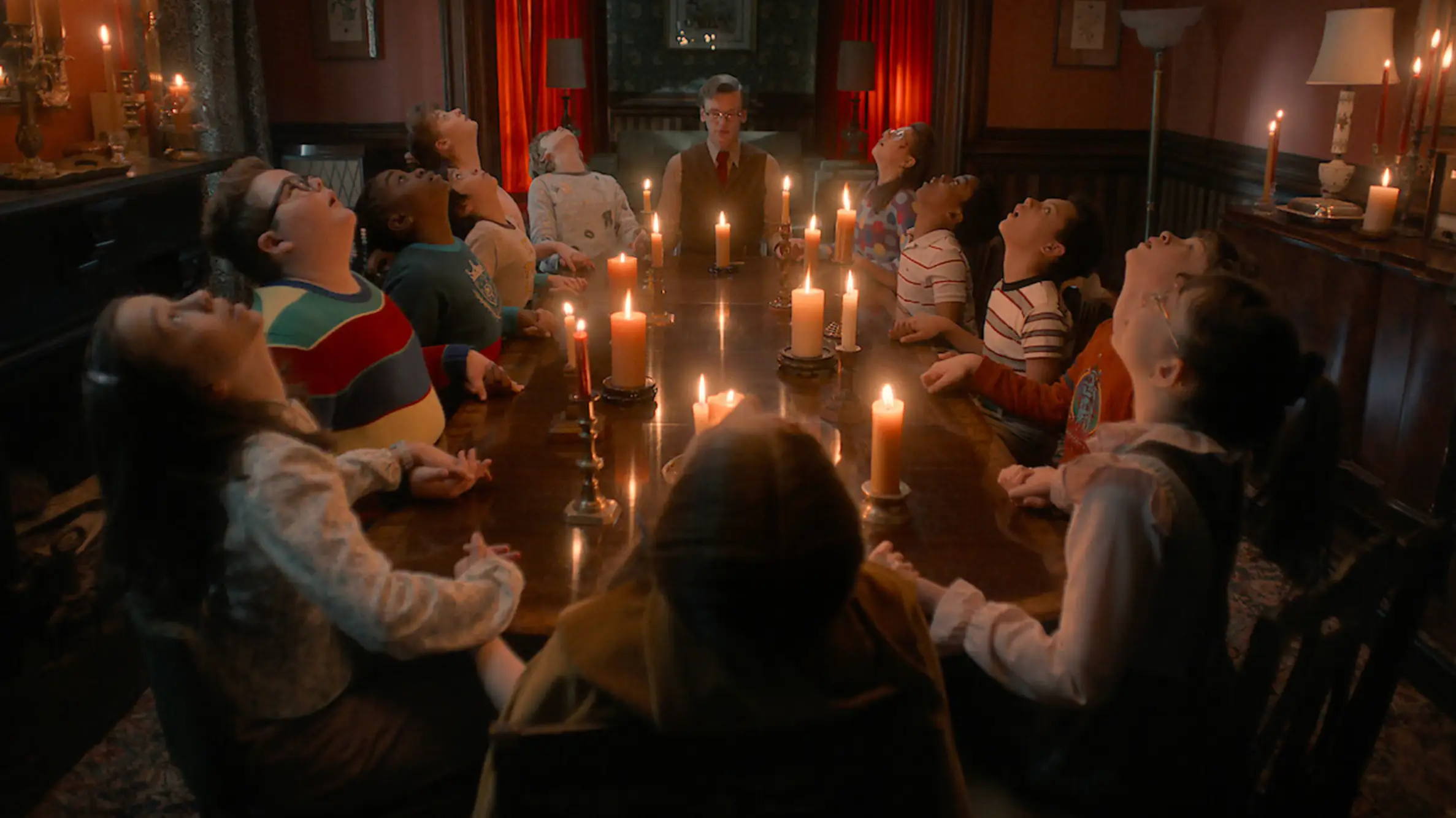How did "Brain Rot" become Word Of The Year?
Updated on
Published on

- Brain rot meaning: a tongue in cheek way to describe the fried, foggy feeling that follows endless scrolling, doomscrolling, and low value content binges
- Why it blew up: meme heavy feeds, viral slang, bizarre trends, and a word of the year spotlight made brain rot the perfect shorthand for digital content overload
- Where you see it: TikTok brain rot, YouTube rabbit holes, skibidi brainrot, reality TV marathons, and fandom hyperfixations that hijack every conversation
- How it feels: mushy attention, time blindness, meme vocabulary leaking into real life, a compulsion to say just one more video
- Fix it without quitting the internet: small guardrails, mixed media diets, more active use, planned offline breaks, and sleep that actually happens
What is brain rot
Brain rot is modern slang for the way your mind feels after digital content overload. It covers two related ideas. First, the zombie haze that follows an hour of short clips or a night of low effort memes. Second, a playful confession of obsession as in I have Minecraft brainrot or I have Bridgerton brain rot. Either way, the phrase is a humorous, self aware nod to how seriously unserious our media diets can be.
The term is not medical. It is a cultural wink. People use it to roast their own habits, to commiserate with friends, and to label content that is funny for twelve seconds and somehow lives rent free for twelve hours.

Why brain rot went mainstream
The last few years created a perfect storm for brain rot meaning to spread. Feeds became faster and stranger. AI remix culture pumped out endless meme slurry. Short form algorithms learned to anticipate our impulses better than we do. People needed a single phrase that could say both this is hilarious and my neurons are begging for mercy. Brain rot did the job.
A few catalysts that pushed it into the spotlight
- Fandom engines: early brainrot jokes thrived on Tumblr, Twitter, and stan corners where hyperfixation is a love language
- TikTok acceleration: short clips, NPC streams, earworm sounds, skibidi brainrot, and infinite For You pages turned minutes into hours
- Meme economy honesty: creators started tagging their own posts as brain rot, a wink that made viewers feel in on the joke
- Parent panic and curiosity: kids looped surreal trends until adults learned the lingo and asked what is brain rot
By 2024 the phrase crossed from niche to mainstream conversation, not because experts decreed it, but because the average person needed a simple label for a very specific twenty first century feeling.
How brain rot feels in real life
Here are the telltale signs many people report
- Time blindness: you promise one more video while your battery slides to two percent
- Mushy attention: books, films, and long videos feel heavier than they should today
- Vocabulary creep: rizz and skibidi leave the timeline and land in family conversations
- Decision fatigue: small choices feel harder after an hour of novelty overload
- The post scroll slump: a foggy, low energy state that makes everything look grey
Why our brains love the stuff that causes brain rot
There is a simple recipe behind digital content overload
- Novelty every few seconds: new faces, jokes, and visuals push the reward system and make slow tasks feel dull by comparison
- Variable rewards: sometimes a clip is amazing, sometimes not, and that lottery feeling keeps you pulling the slot lever
- Frictionless design: autoplay, infinite scroll, and next video remove the moment where you would naturally stop
- Social gravity: friends share seven memes, you watch eight; group threads beat willpower eight days a week
- Low effort high payoff: many posts ask nothing of you and still deliver a small hit of emotion or laughter
None of this makes you weak. It makes you human inside systems designed to be sticky. Recognizing the design patterns helps you steer without quitting the internet.
The fun side of brain rot
There is also a bright, communal side. People happily claim brainrot TikTok when a creator makes them laugh for a week straight. Fans brag about brain rot for a show or game they love. It is a badge of joyful obsession, not only a confession of doomscrolling. The joke works because we are in on it. We know our attention is precious, and the humor gives us room to adjust without shaming ourselves for liking silly things.
Make brain rot manageable, not miserable
You do not need a monastery. You need small, realistic tweaks that fit normal life.
Tiny guardrails
- Set a short timer: thirty to forty five minutes, then stand up, get water, reset
- Pick a soft curfew: phones down after midnight, or whatever protects your sleep
Balance the feed
- One for one rule: for every junk scroll, add one thing that teaches or truly delights, a good article, a how to video, a chapter of a book
- Follow quality: unfollow sludge, follow creators who inspire, inform, or craft jokes with care
Active beats passive
- Engage or create: leave a thoughtful comment, save ideas, make a tiny post of your own
- Switch modes: if you just watched, then write; if you just read, then draw; different circuits wake up
Offline on purpose
- Micro breaks: ten minute walk, stretch, doodle, make coffee and stare out the window
- People time: call a friend, play a quick board game, cook with someone, no screens
Sleep like you mean it
- Protect the reboot: nothing accelerates brain rot like three AM doomscrolling; close the app and let your brain do its cleanup cycle
A seven day brain rot reset
A simple plan you can keep without swearing off the internet
- Day one: set a bedtime and a five minute pre sleep stretch
- Day two: prune three accounts that waste your time and follow one that adds value
- Day three: use a thirty minute watch window and a ten minute break, repeat if needed
- Day four: swap one meme binge for a single episode of a thoughtful show or a chapter of a book
- Day five: do one offline thing that takes fifteen minutes, a walk, dishwashing with music, a quick sketch
- Day six: create something tiny, a captioned photo, a short journal note, a one minute beat
- Day seven: review what helped and lock in the two habits that felt easiest
This is not a cleanse. It is a nudge. Small changes add up faster than grand declarations.

Final thought
Brain rot is the internet’s funniest label for digital content overload. It packs a cultural self portrait into two short words. We laugh at ourselves, we bond over our zombie moments, and then, if we are smart, we tilt our habits a few degrees toward better. Keep the memes, keep the For You page, keep the fandom joy. Just give your brain a breath between servings. The joke will still land after your walk, and your head will feel a lot less like mashed potatoes.
FAQ
What is brain rot
Brain rot is slang for the foggy, fried feeling after digital content overload. It also describes a playful obsession with a show, game, or meme that takes over your thoughts. It is not a medical diagnosis, just internet shorthand for too much low value content.
What does brain rot mean on TikTok
On TikTok, brain rot means being hooked on short clips and trends to the point your attention feels cooked. Users also say they have fandomfandomfandom brainrot when they cannot stop thinking about a specific show, song, or creator.
Is brain rot a real condition
No. Brain rot is slang, not a clinical disorder. It does point to a real problem, heavy doomscrolling and low effort media can leave you foggy, distractible, and tired.
What causes brain rot
A mix of novelty overload, variable rewards in algorithmic feeds, frictionless design such as autoplay and infinite scroll, and social pressure from friends and group chats. Together these keep you scrolling past the point of mental fatigue.
What are the signs of brain rot
Time blindness, mushy attention, meme slang slipping into serious conversations, decision fatigue, and a post scroll slump where everything feels dull for a while.
Why did brain rot become so popular in 2024
Because it perfectly captured the cultural moment. Bizarre meme trends, AI remixes, and nonstop short video made people joke that the internet was melting their brains, and the term became a word of the year level buzzword.
What is skibidi brainrot
It is a jokey label for the near zombie like obsession with the Skibidi Toilet meme videos. Kids loop the surreal songs and dances until the whole house knows the tune by heart.
Is brain rot only a Gen Z thing
No. Gen Z and Gen Alpha popularized the term, but anyone who doomscrolls can feel brain rot. Parents, students, and office workers all use the phrase now.
How do I stop brain rot fast
Use a two step reset. Step one, take a 10 to 15 minute offline break and move your body. Step two, curate your feed and set a short timer for the rest of your session so you stop before the slump hits.
What are long term fixes for brain rot
- Add tiny guardrails such as a bedtime for your phone and short session timers
- Balance your feed one for one, for every junk scroll, add one educational or truly delightful item
- Prefer active use over passive, comment, create, or take notes
- Plan offline micro breaks each day, a walk, a stretch, a quick coffee with no screens
- Protect sleep, late night doomscrolling makes next day fog much worse
Does brain rot affect productivity
Yes. Heavy novelty and fragmented attention make sustained work feel harder. Small changes such as session timers, focused playlists, and single task blocks can restore momentum.
Can brain rot be good
In a playful sense, yes. People claim brainrot for things they love, like a new album or game. The fun part is the shared enthusiasm. The healthy approach is to enjoy the joy while keeping a little structure so obsession does not crowd out everything else.







